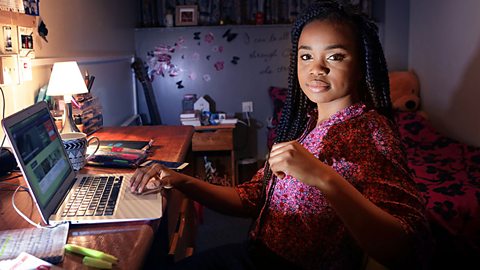Studying and exam season can be like a rollercoaster for your emotions т you have ups and downs. There are times when you feel like you're going round in circles т the loop-the-loops т and times when you feel like you're at a standstill т the dreaded queue! But there are a couple of things you can do to help boost your confidence and build resilience to get you through to the other side.
This video sees developmental psychologist, Dr Heather Branigan, guide you through the nuts and bolts of resilience, so that the wheels don't fall off your study-coaster this school yearтІ OkayтІ enough with the rollercoaster analogies! Tap play on the video, then read our highlights below.
Eilidh: Hi, I'm Eilidh. When I'm studying if I get a setback, I feel like it really knocks my confidence. So I'm here today to talk to Heather who's an expert and she's gonna help build up my resilience when I'm studying. Hi Heather.
Heather: Hello, hopefully I can help.
Eilidh: I want to ask you how do I keep going when I'm struggling?
Heather: It sounds like resilience might help. Resilience is really just our capacity to bounce back in the face of adversity. And importantly, resilience is a dynamic skill, which just means that something that we can be trained in and we can develop. Resilience is also something that we don't just have ourselves but it's something that we develop through interactions with our social network and knowing where to go for support. Another really important thing about resilience is self-compassion. And this is really just understanding that mistakes are a very natural part of being human and in fact, we learn a lot through making mistakes.
Eilidh: I need to remember that. So, how do I develop my resilience?
Heather: One really good tip for developing your resilience and your learning is to break down a task into small and manageable chunks. So you might find it useful to not just have a to-do list, but also have a done list and then that way you can move tasks from your to-do list to your done list and also celebrate your achievements along the way. Another important thing to develop your resilience is to map out who your social network is, so this might be; your friends, your family, or also, wider support structures such as individuals at school, teachers or maybe even people like your GP. If you have had a mistake and you're feeling like you're struggling, then perhaps try writing a letter to yourself like you were writing to your best friend. And this is because we can sometimes be our own harshest critic. The final thing that I would suggest in terms of developing your resilience, is to focus on self-care. So that means different things for different people. But the most important thing is that you take time outside of your studies, to focus on something that you enjoy and allows you to come back to your studies feeling refreshed.
Eilidh: Thank you so much Heather, this has been really helpful.


What is resilience?
You may be wondering what resilience means, especially in relation to studying. Resilience is how you positively adapt in the face of adversity or challenge. This might mean catching up with school work after illness, bouncing back after a disappointing grade, or dealing with challenges outside of school. Setbacks are an inevitable part of school and life, so developing skills in resilience is a great way to keep going in the face of adversity.
How resilient you are does not depend on you alone т we develop skills in resilience by knowing where and how to receive support from our social circle, our community and also key places such as school. The great thing about resilience is that it's possible to change and develop your resilience skills. Which leads us quite nicely toтІ
How can we develop our resilience?
- You can set realistic and achievable study goals for yourself. This can help when you might feel overwhelmed with your studies. When you set your goals, try to break down the main task into as many smaller chunks as possible. You might find it useful to have a тdoneт list as well as a тto doт list т allowing you to celebrate the progress you make along the way.
- We all need to take breaks and allow time to unwind т even more so during stressful, busy times. Self-care is different for everyone; it might mean doing something creative, going for a run, or having a dance party for one!
- Mindfulness activities can be useful for developing resilience. The next time you start to feel stressed or anxious, take five minutes to just pause. Pay attention to your breath т are you breathing up high in your chest? Or lower down in your stomach? Is your breathing slow, or fast? Perhaps try taking a few deep breaths and notice any changes to how that feels.


So now you've mastered a couple of effective study techniques to help with your schoolwork, you can combine these with other techniques from the pages below to help you on your way to becoming a study-superstar!

If you need support
You should always tell someone about the things youтre worried about. You can tell a friend, parent, guardian, teacher, or another trusted adult. If you're struggling with your mental health, going to your GP can be a good place to start to find help. Your GP can let you know what support is available to you, suggest different types of treatment and offer regular check-ups to see how youтre doing.
If youтre in need of in-the-moment support you can contact , where you can speak to a counsellor. Their lines are open 24 hours a day, 7 days a week.
There are more links to helpful organisations on ТщЖЙдМХФ Action Line.

Why taking study breaks is a good thing
Dr Carolina Kuepper-Tetzel knows a thing or two about staying focused whilst studying, so she's shared her pearls of wisdom in this article.

Why you might be using flashcards wrong
We all know how to use flashcards properly, right? WRONG! It turns out many of us may have been using flashcards incorrectly all along...

Why it's best not to cram and other study tips
There has to be a better way to study than an all-night cramming session doesn't there? We ask Dr Carolina for her tips!
